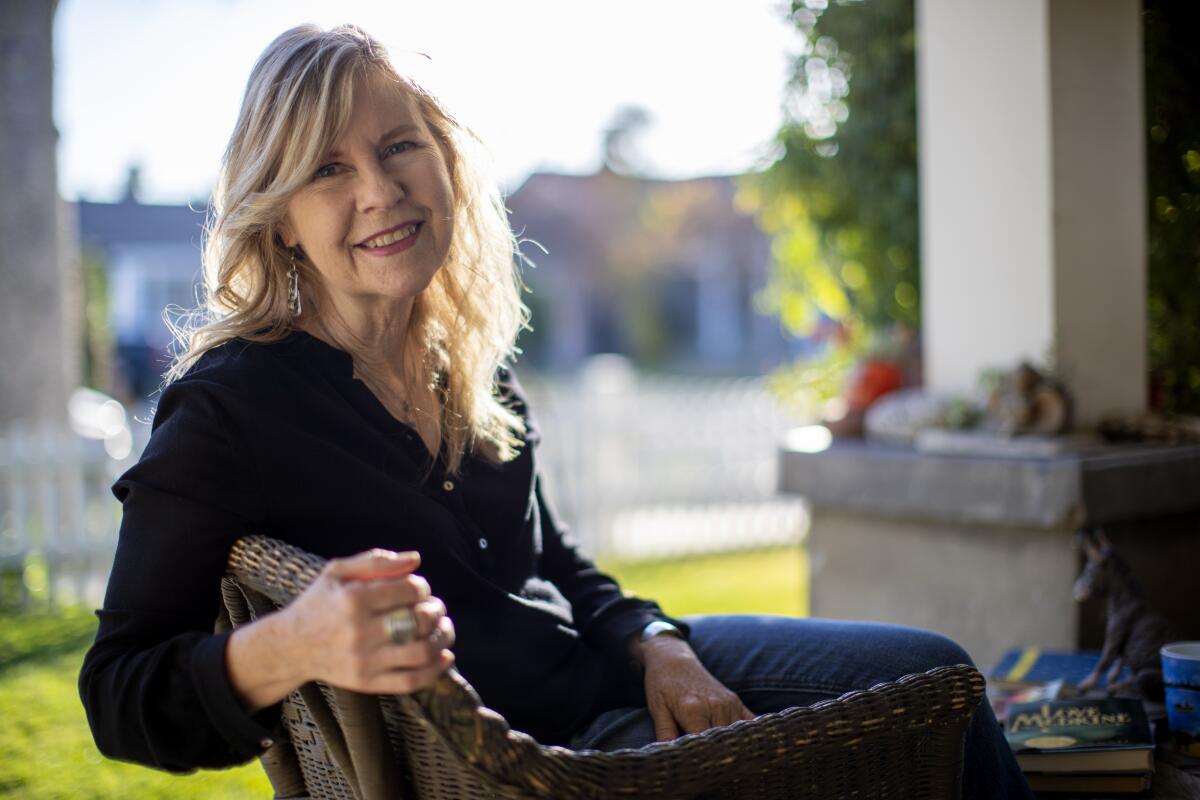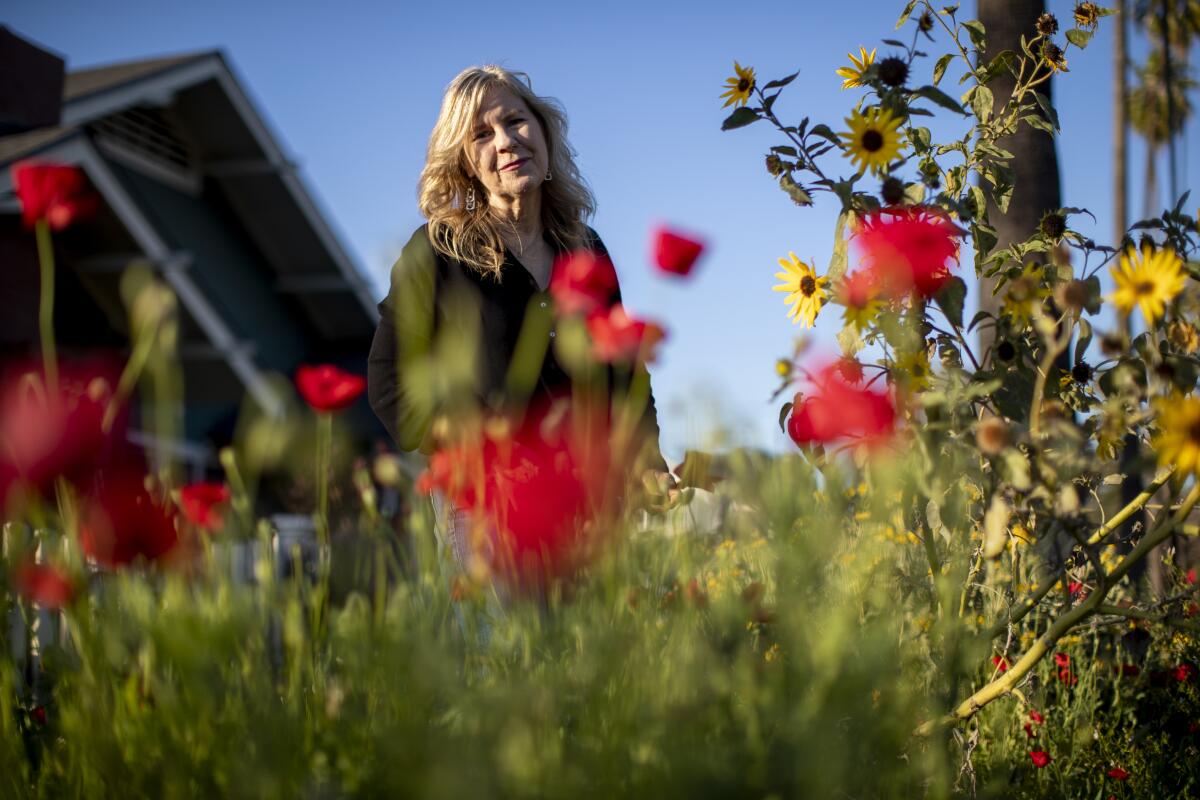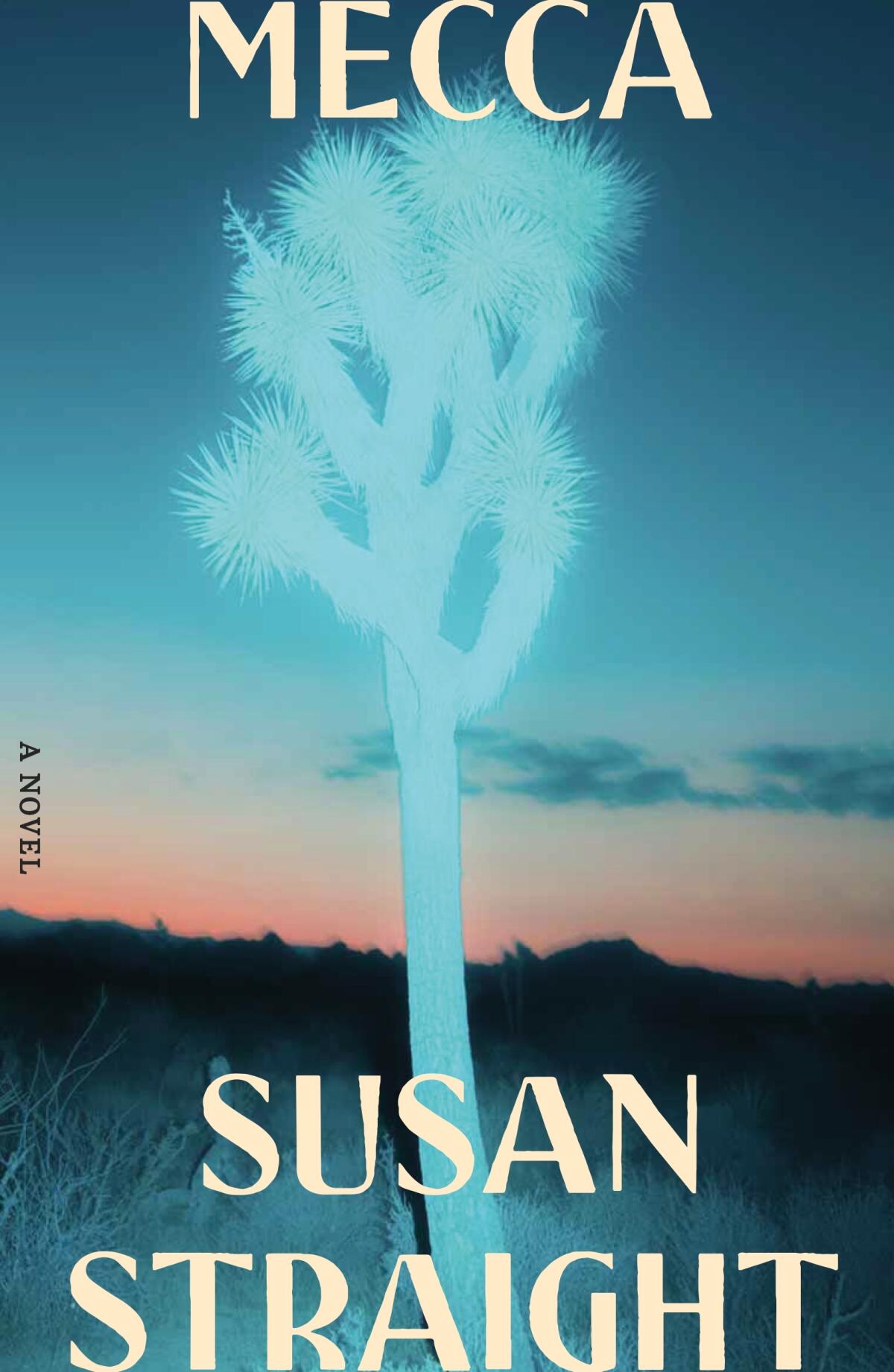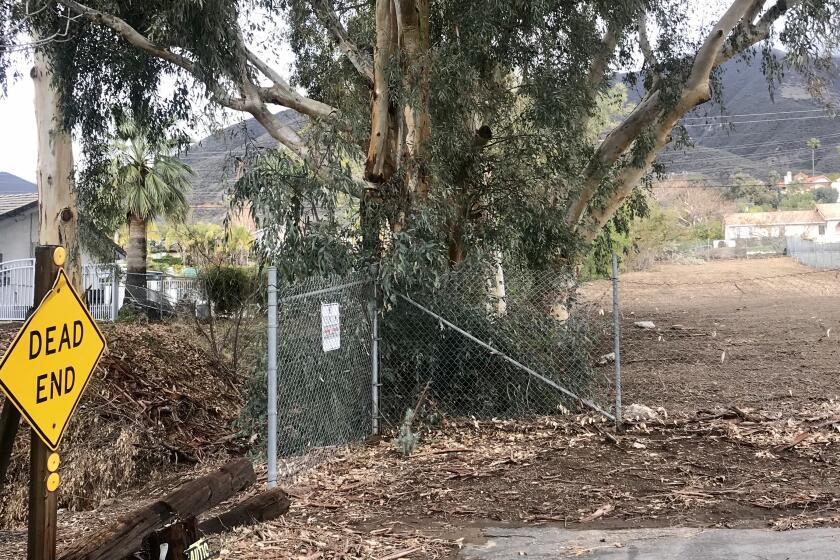Travels and pop-ins with Susan Straight, bard of overlooked California

- Share via
On the Shelf
'Mecca'
By Susan Straight
FSG: 384 pages, $28
If you buy books linked on our site, The Times may earn a commission from Bookshop.org, whose fees support independent bookstores.
There’s a wicker chair on Susan Straight’s porch that beckons all the people of Riverside to sit down and shed their burdens. Thrift-store cozy with cracked paint and a leafy-print cushion — everyone’s mom or grandmother had a chair like it in the ’80s. Cry, laugh or spill beer on it, no matter. The chair has seen and heard it all.
“People sit down here, and they tell me their life story,” Straight said. This might sound like a novelist’s embroidery, but with Straight, there is no doubt. Her life is full of the people of Southern California as they really are, and so are her books. Since her celebrated 1990 debut, “Aquaboogie,” most of which she wrote in her car on a windy bluff near her house, the Riverside native has written eight novels, including “Highwire Moon,” a 2001 National Book Award finalist. On visits to the Coachella Valley, she signed copies of the book, about a family separated while crossing the border, for migrant farmworkers. They told her their border-crossing stories too.
“People were crying,” Straight remembered, “and saying this is the first book they’d ever owned. I’d ask who they wanted me to sign it to, and they’d say the whole family.”
Her new novel, the ambitious and enthralling “Mecca,” is set, like nearly all her fiction, in the Inland Empire and high desert areas. The native tobacco plants, the San Jacinto range, the baked-in racism — all are seen through the eyes of the overlooked and written-off. The citrus pickers. The old Latina woman living on inherited land, scared the county will take it away. The Black boy with braids who drops his phone in front of a cop. None of them take history lightly because it’s written too much of their destiny.
Quarantined in Riverside, novelist Susan Straight watches “Gunsmoke” and “Gentefied” and gives away Judy Blume and National Geographic.
Straight has tackled her own history too. Her acclaimed 2019 memoir, “In the Country of Women,” researched the matrilineal lines of her Swiss and Canadian family and that of her ex-husband, Dwayne, who is Black. The one part of her past she hasn’t ever really written about is the loss of her younger brother. When she momentarily speaks about him, how he fell in with a bad crowd, her speech, typically quick and chatty, slows down.
Every day at Straight’s house, friends and loved ones parade in and out, in person or in spirit. During the afternoon we spent together, her good friend and fellow novelist Alex Espinoza called, as well as Delphine, one of her three adult daughters. When we left the house for a tour of Riverside, she grabbed a “boozy” cake to drop off for another friend. On our way back to her house, we chatted with her neighbor, Alfred Garibay, who was fixing up his classic ride for Show & Go, Riverside’s annual spring car show.

Then there’s Straight’s free library, put up early in the pandemic in front of her 1910 Craftsman. She rotates the books, collected in stacks all over her house, based on who she knows will be stopping by. Today, it’s an autistic child who likes young reader books. Through her library chats, she also learned that her neighbors, the Segobia brothers, are actually her cousins.
“It’s not six degrees of separation around here,” she said. “It’s three at most.”
I told Straight she’s the last person in the texting era who still enjoys the pop-in. “Oh yeah,” Straight said. “Around here we call it the kickback. On Friday, it was nonstop.” Then she adds, not unhappily, “I couldn’t get a thing done!”
Listening to those stories might distract her from the legal pads on which she writes in longhand, but then collecting stories is part of Straight’s calling. Her devotion to sharing and reshaping for fiction the stories she’s heard is spiritual, and “Mecca” thrums with that purpose like a hymn. The nurses she knows, on the frontlines of COVID-19, made it into “Mecca.” So have the experiences of her neighbor, one of the first Chicano motorcycle cops in the Riverside Police Department.
Writer Susan Straight traverses a California different than the one Joan Didion observed yet views it through eyes partly focused by her Didion’s writing.
Joan Didion wrote in “Where I Was From” that Californians “did not believe that history could bloody the land, or even touch it,” but in “Mecca,” history is everywhere. The blood has dried, become phantasmagoric now. History, in “Mecca,” is a breathing but ghostly thing passed along from an old wicker chair, generation after generation.
The book begins with Johnny Frías, a California Highway Patrol officer haunted by his mother’s sudden death from pneumonia — but really from being overworked at a packing plant. Other memories still haunt too: In 1999, he witnessed an act of violence in one of the canyons he knows by heart. The mysterious event becomes the centrifugal force of the book.

Straight has stewed for nearly 20 years over many of these characters, including Frías and another central figure, Ximena. A young Mixtec woman only a few months past a harrowing border crossing, Ximena is introduced in a breathtaking chapter as a maid at Seven Palms, a medical spa that hides away women recovering from plastic surgery. Ximena is only acknowledged by other Latinos — the housekeepers, the landscapers, the maintenance guys — never the Anglo patients. Straight’s descriptions of the disembodied women in bandages that obscure everything but their lips or eyes conjures a clinical horror.
In such a place, the hierarchy of American survival is chillingly clear: “There were the male doctors, who cut and abraded and altered the bodies; the American women — nurses and therapists and stylists — who touched the bodies for days afterward; and the Mexicans who touched everything else.”
Straight does not rescue her characters from multiple tragedies, including COVID and police violence, but what gives “Mecca” its compassion and even hope is Straight’s faith in their resilience. The people here, her books affirm, will always persevere. They have since the Anza Crossing in 1774, led by Juan Bautista de Anza, a Spanish military captain who wanted Spain to open a trade route to New California — a place today marked by a stone monument.
Straight drove us to Anza Crossing and wandered the land in her wool-lined jean jacket, shivering from the pre-rain winds. In 2022, Anza Crossing and its surroundings, including the Santa Ana River, are part park, train bridge and homeless encampment. Transience and struggle right alongside recreation and privilege, a familiar mix in today’s California.
Susan Straight’s new memoir, “In the Country of Women,” depicts the tough, trauma-burdened women who have populated her life.
She sees so much beauty in the places Californians have taught themselves to overlook. A frequent road-tripper — local and cross-country — Straight says this about the much-maligned freeway: “They are freeways of love, right? If you’re getting on the freeway, and it’s not for work, it’s because you’re going to help somebody you love.”
Most recently, she drove with Dwayne to help their daughter Delphine with a move in Northern California. “We go up the 215, and then we’ve got to tell our San Bernardino stories. And then on the 210, we tell our Rancho Cucamonga stories, and in Pasadena, it’s ‘Remember that first time we went to the Rose Bowl?’” And on and on, up the Grapevine. “It’s all so beautiful,” Straight said. They kept the radio off the whole time; their stories were enough.
Straight will be in conversation with Ivy Pochoda and signing copies of “Mecca” at Skylight Books on Tuesday, March 15, at 7 p.m.
More to Read
Sign up for our Book Club newsletter
Get the latest news, events and more from the Los Angeles Times Book Club, and help us get L.A. reading and talking.
You may occasionally receive promotional content from the Los Angeles Times.








